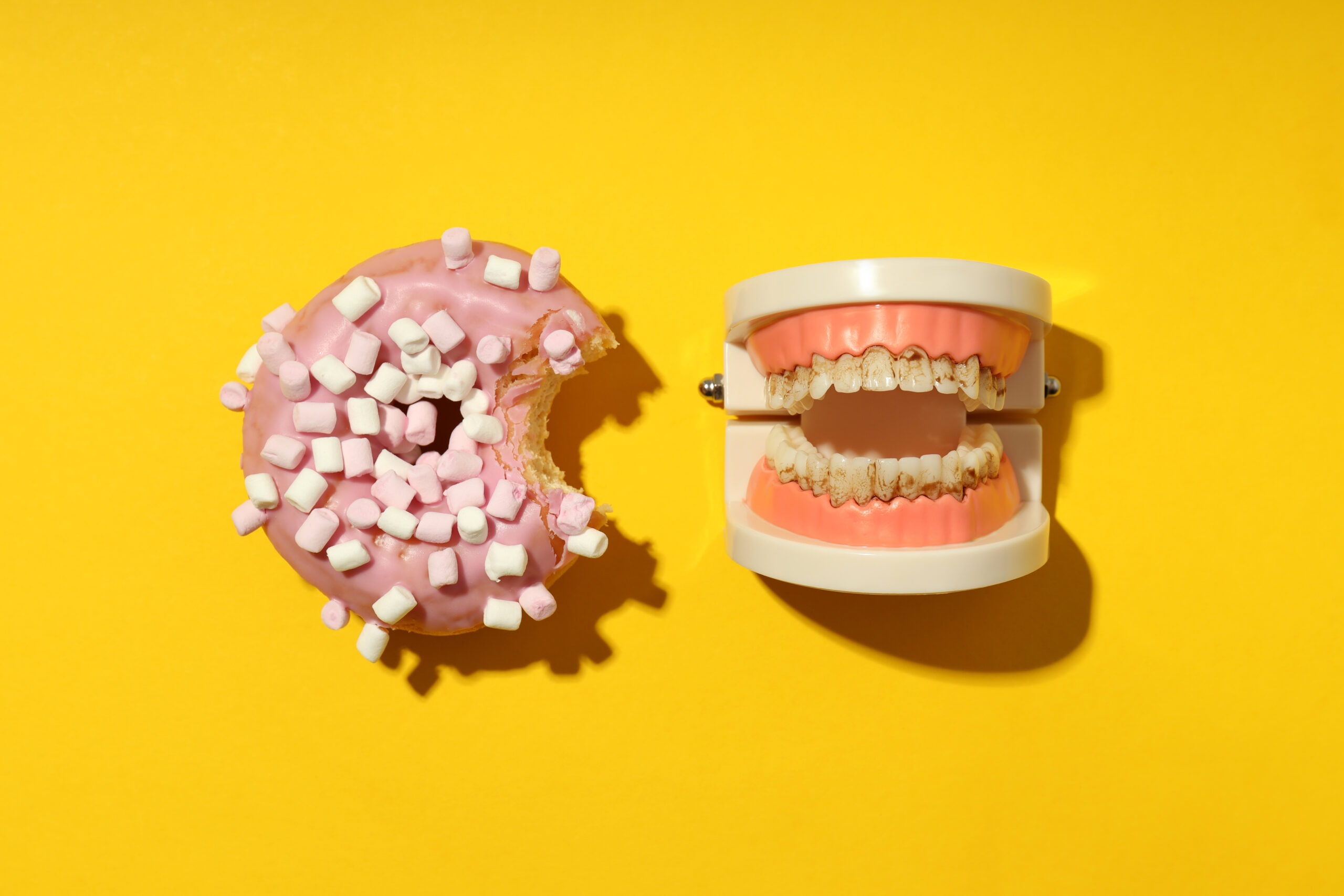Tooth decay is one of the most common chronic health issues worldwide, affecting individuals of…

Healthy Gums, Healthy Body—The Connection You Can’t Ignore
Did you know that the health of your gums can have a major impact on your overall well-being? That’s right, those little pink tissues in your mouth play a crucial role in maintaining a healthy body. From gum disease to other oral issues, there are various gum issues affecting health that can lead to serious health consequences if left untreated. So if you thought brushing and flossing were just important for keeping your teeth clean and white, think again. In this blog post, we’ll dive into the link between healthy gums and a healthy body that you simply can’t ignore. So let’s explore the importance of gum care and how it can prevent gum disease and other oral issues from negatively affecting your health.
Gum Health and Its Effect on Your Overall Health
The health of your gums goes beyond just having a nice smile. It plays a vital role in maintaining overall well-being. Oral care for health is crucial because gum disease and other oral issues can have serious consequences if left untreated. Poor gum health can lead to conditions such as heart disease, diabetes, respiratory infections, and certain cancers. This is because the bacteria present in gum disease can enter the bloodstream and cause inflammation, affecting various organs in the body.
To ensure the foundation of your overall health is strong, it is important to prioritize gum health as part of your oral care routine. Regular brushing, flossing, and dental visits are essential to reduce the risk of gum diseases and their associated health complications. Taking care of your gums not only improves oral health but also promotes a healthy body. So, don’t overlook the importance of gum care and its impact on your overall well-being.
Unveiling the Correlation between Gum Diseases and Other Health Complications
Oral care for health is more important than ever when it comes to the link between gum diseases and other health complications. Research has shown that maintaining healthy gums can have a direct impact on your overall well-being. When gum disease occurs, bacteria from the infection can enter the bloodstream and travel to other parts of the body, leading to serious health issues.
For instance, gum disease has been linked to an increased risk of heart disease, as the bacteria can cause inflammation in the blood vessels. Similarly, diabetes and gum disease have a bidirectional relationship, with diabetes making gum disease more severe and gum disease making it more difficult to control blood sugar levels. Respiratory infections, such as pneumonia, can also be caused by bacteria from gum disease entering the lungs.
Additionally, certain cancers, including pancreatic cancer and kidney cancer, have been associated with gum disease. The exact mechanisms are still being studied, but inflammation caused by gum disease may contribute to the development and progression of these cancers.
These findings highlight the importance of taking care of your gums to maintain a healthy body. Incorporating good oral care practices, such as brushing and flossing regularly, can significantly reduce the risk of gum disease and its potential impact on your overall health. So, don’t neglect your gum health, as healthy gums truly do lead to a healthy body.
Common Gum Issues: Causes, Symptoms, and Treatment
Gum health problems can arise when proper oral care is neglected, and they can have a significant impact on both your gums and your overall health. One of the most common gum health issues is gum disease, which is caused by a buildup of plaque and bacteria along the gumline. This can lead to inflammation, bleeding gums, and eventually, tooth loss if left untreated.
Other common gum health problems include gum recession, which is when the gums pull away from the teeth, exposing the tooth roots. This can cause tooth sensitivity and increase the risk of tooth decay. Gum abscesses are another issue, characterized by a painful, pus-filled pocket in the gum tissue. This can cause swelling, pain, and even a foul taste in the mouth.
Tooth grinding, or bruxism, can also impact gum health. The constant grinding and clenching of the teeth can put pressure on the gums, leading to gum recession and gum sensitivity. Lastly, oral infections, such as oral thrush or canker sores, can affect gum health and cause discomfort.
If you’re experiencing any of these gum health problems, it’s important to seek professional help. Your dentist or oral surgeon can assess the condition of your gums and provide appropriate treatment, which may include deep cleaning, antibiotics, or other interventions. Additionally, practicing good oral hygiene at home, such as regular brushing and flossing, can help prevent and manage gum health problems.
Remember, maintaining healthy gums is not just about having a nice smile. It’s about ensuring a healthy body, as gum health problems can have far-reaching consequences if left untreated. So take care of your gums to maintain a healthy smile and a healthy body. If you are concerned about the health of your gums, schedule a consultation with the team at the Center for Restorative, Cosmetic, and Implant Dentistry.
Preventing Gum Issues—The Importance of Proper Oral Care
Proper oral care plays a crucial role in preventing gum issues and maintaining healthy gums, which in turn promotes a healthy body. When it comes to gum health, prevention is key. By incorporating good oral care practices into your daily routine, you can significantly reduce the risk of developing gum diseases and their associated health complications.
Brushing your teeth at least twice a day with a soft-bristled toothbrush or electric toothbrush and fluoride toothpaste helps remove plaque and bacteria that can lead to gum disease. It’s also important to brush along the gumline to ensure a thorough cleaning. Flossing daily is another essential step in preventing gum issues, as it helps remove food particles and plaque from between your teeth and along the gumline.
Using an antibacterial mouthwash can further protect against gum disease by killing bacteria that can lead to infection and inflammation. A balanced diet rich in fruits, vegetables, and whole grains can also contribute to gum health. Avoiding sugary and sticky foods that can stick to your teeth and increase the risk of gum problems is important as well.
Quitting smoking or avoiding it altogether is crucial for maintaining healthy gums, as smoking is a significant risk factor for gum disease. Additionally, staying hydrated by drinking plenty of water helps maintain saliva production, which helps wash away bacteria and keeps your mouth moist.
By following these tips and prioritizing proper oral care, you can prevent gum issues and maintain healthy gums, ultimately promoting a healthy body. Don’t overlook the crucial role of oral care in preventing gum issues, as healthy gums truly do lead to a healthy body.
Maintaining Your Gum Health for Overall Well-being
Taking care of your gums is essential for maintaining overall health and well-being. Here are some tips to help you maintain optimum gum health and promote a healthy body.
- Brush and floss regularly: Brush your teeth at least twice a day using a soft-bristled toothbrush and fluoride toothpaste. Don’t forget to clean along the gumline to remove plaque and bacteria. Flossing daily helps remove food particles and plaque from between your teeth and along the gumline.
- Use an antibacterial mouthwash: Adding an antibacterial mouthwash to your oral care routine can help kill bacteria that can lead to gum disease. It’s an extra step to protect your gums and promote oral health.
- Follow a balanced diet: A diet rich in fruits, vegetables, and whole grains can contribute to gum health. These foods are packed with essential nutrients that support gum tissue health. Avoid sugary and sticky foods that can stick to your teeth and increase the risk of gum problems.
- Quit smoking: Smoking is a significant risk factor for gum disease. Quitting smoking or avoiding it altogether can greatly improve the health of your gums and promote overall well-being.
- Stay hydrated: Drinking plenty of water helps maintain saliva production, which aids in washing away bacteria and keeping your mouth moist. It’s an easy way to support gum health and overall oral health.
By following these tips, you can maintain optimum gum health and promote a healthy body. Remember, healthy gums lead to a healthy body, so prioritize your gum health as part of your overall oral care routine.
When to Seek Professional Help: Recognizing the Signs
Recognizing when to seek professional help for your gum health is crucial in maintaining a healthy body. While practicing good oral care is essential, there are certain signs that indicate it’s time to consult a dental professional. If you notice persistent gum bleeding, swollen or tender gums, persistent bad breath, loose teeth, or changes in your bite, it’s important to schedule an appointment with your dentist. These could be signs of gum disease or other oral health issues that require professional intervention. Remember, early detection and treatment can prevent further damage and ensure a healthier smile and body. Don’t ignore these signs and take proactive steps to address any gum health concerns. Your dental professional at the Center for Restorative, Cosmetic, and Implant Dentistry will be able to provide the necessary treatment and guidance to maintain healthy gums and promote overall well-being. Prioritize your gum health and seek professional help when needed to ensure a healthy body for years to come.


